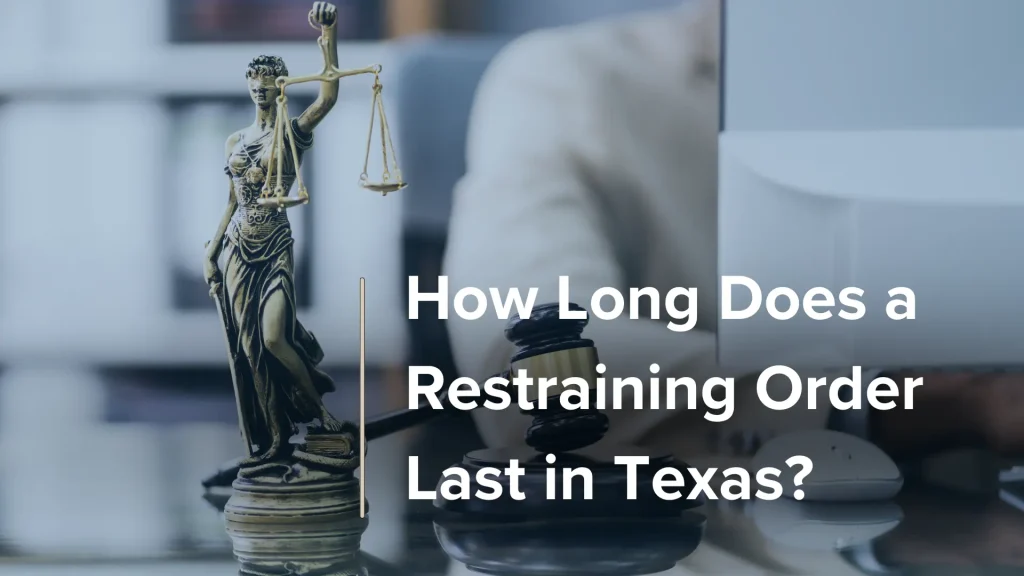
How Does a Restraining Order Work?
How Long Does a Restraining Order Last?
Most protective orders in Texas last for two years, although there are times when a court might impose one for a longer term. You can apply for a new order at the conclusion of your current one.
What Are the Requirements for a Restraining Order?
The requirements for a restraining order in Texas vary depending on the nature of the threat and the relationship between the parties involved. Common scenarios warranting the issuance of restraining orders include domestic violence, stalking, or harassment.
To obtain a restraining order, you must demonstrate:
- Credible Threat of Harm – There must be a clear and credible threat of harm, or actual harm must have occurred. This could include physical violence, verbal threats, or persistent harassment that puts your safety at risk.
- Necessity of Protection – The petitioner must prove that the restraining order is necessary to prevent further harm. This may involve presenting evidence of past incidents and demonstrating the ongoing risk to their safety.
- Relationship Between Parties – The relationship between the parties involved is critical in determining the type of restraining order issued. Texas law allows restraining orders involving family members, household members, or individuals in a dating relationship. In cases of stalking or harassment, you could obtain a restraining order even if there is no close relationship between the parties.
Can I File a Restraining Order Online?
Many legal processes are moving online in today’s digital age, but filing a restraining order in Texas still requires some in-person steps. While some forms and instructions are available online, the filing typically involves visiting the courthouse. Before you file, consider the following:
- Electronic Filing Options – Some counties in Texas may allow the filing of restraining order petitions electronically. It’s essential to check with your local court to see if this option is available. Even if you can file your petition electronically, you may still need to attend a court hearing in person.
- Availability of Online Resources—Texas courts offer online access to necessary forms and guidance on filing for a restraining order. This can be particularly helpful for those needing to prepare their case before court.
- Legal Assistance – An attorney can correctly file all required paperwork and effectively present your case. A lawyer can also guide you through the entire process, helping to ease the stress and confusion that often accompany legal proceedings, especially for those seeking a restraining order.
Can I Get a Restraining Order for No Reason?

Restraining orders are severe legal instruments that require sufficient cause to obtain one. You must demonstrate to the court that you face a legitimate threat to your safety or well-being. Before filing, consider the following:
- Legitimate Grounds Only – Simply wanting to limit someone’s actions without a valid reason will not suffice. The court scrutinizes each case to justify the request for a restraining order. This rigorous process helps prevent misuse of restraining orders and ensures they protect those who need them when necessary.
- Requirement of Evidence – The court requires substantial evidence to issue a restraining order. This could include police reports, medical records, witness statements, or other documentation that supports your claim of harassment, abuse, or threats.
- Consequences of False Claims – Filing for a restraining order without a legitimate reason can have legal repercussions. The court may dismiss the case, and in some instances, the filer could face penalties for making false claims. It’s essential to approach this process with honesty and integrity.
Contact a Texas Family Law Attorney Today
If you’re seeking a restraining order and need legal help, the compassionate, understanding Texas family law attorneys at the Adams Law Firm can assist. Obtaining a restraining order can be scary and overwhelming, but we are here to help. Let us be your fierce advocates during this challenging time. Call our office today at (281) 391-9237 or contact us online to get the confidential help you need and deserve.
Related Posts:
Win a Restraining Order Hearing in Texas
Filing for Divorce in the Military



